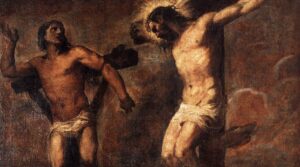
Verily I Say Unto Thee
And he [the criminal] said, “Jesus, remember me when you come into your kingdom.” And he said to him, “Truly, I say to you, today you will be with me in paradise.”
Luke 23:42-43
Christians throughout the ages have marveled at both the faith of the criminal on the cross beside Jesus and at Jesus’ loving, merciful, and gracious response to him. St. Cyril of Jerusalem, reflecting on this powerful scene, asks: “What power, O robber, led thee to the light? Who taught thee to worship that despised Man, thy companion on the Cross?”[1]
Why did that criminal come to believe in Jesus? What did he see or observe about Jesus, who was suffering with him? The other criminal didn’t believe. Instead, he mocked Jesus. What power led this one particular unnamed criminal to believe that the man beside him crying out, “My God! My God! Why have you forsaken me?” was truly the King of Kings?
 Perhaps the criminal learned or witnessed, in those few hours, more than we are told. But ultimately Cyril answered his own question rightly: “O Light Eternal, which gives light to them that are in darkness!” Who else, but the Light Eternal, the Light from Light, could move that hard and angry heart as it suffered a miserable death on the cross? Who else could have moved your heart and mine? “O Light Eternal, which gives light to them that are in darkness!”
Perhaps the criminal learned or witnessed, in those few hours, more than we are told. But ultimately Cyril answered his own question rightly: “O Light Eternal, which gives light to them that are in darkness!” Who else, but the Light Eternal, the Light from Light, could move that hard and angry heart as it suffered a miserable death on the cross? Who else could have moved your heart and mine? “O Light Eternal, which gives light to them that are in darkness!”
And why does this criminal who will never be able to produce fruit from his faith get this beautiful promise from Jesus? First, his belief, and Jesus’ promise, have produced much fruit over the past 2000 years. Second, the criminal, in those last hours, did the work of God the Father. How? As Jesus taught us in John 6:29, “This is the work of God, that you believe in him whom he has sent.” The criminal believed. He did the work. Therefore, Jesus promised him, and all who believe, “Truly, I say to you, today you will be with me in paradise.”
And how can Jesus make this promise to the criminal? Today, Jesus descends to the dead. How can the criminal be with him in paradise? Listen to St. Augustine’s imagined response of Jesus answering this question as if the criminal asked it:
Recognize to whom you are commending yourself. You believe I am going to come, but even before I come, I am everywhere. That is why, although I am about to descend into hell, I have you with me in paradise today. You are with me and not entrusted to someone else. You see, my humility has come down to mortal human beings and to the dead, but my divinity has never departed from paradise.
We too commend ourselves to Jesus. He promises all of us sons and daughters of Adam, who believe in him, that we too will be with him in paradise!
Because Adam touched the tree
he had to run to the fig;
he became like the fig tree,
being clothed in its vesture:
Adam, like some tree,
blossomed with leaves.
Then he came to that glorious
tree of the cross,
put on glory from it,
acquired radiance from it,
heard from it the truth
that he would return to Eden once more.[2]
Fr. John Laffoon
Minister to Youth & Families
[1] The Catechetical Lectures, Cyril of Jerusalem.
[2] Ephrem the Syrian, Hymn on Paradise

